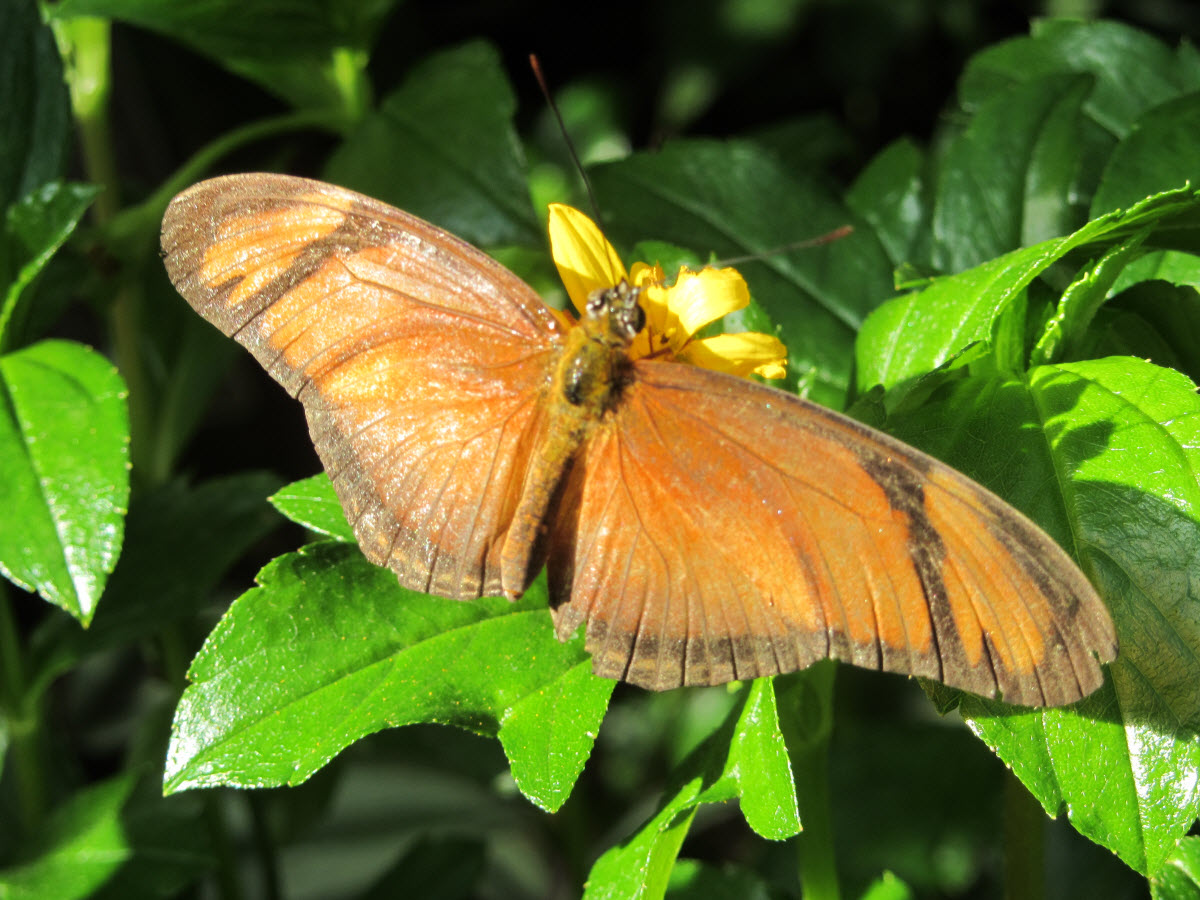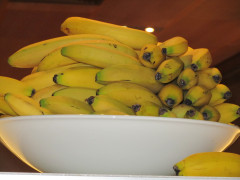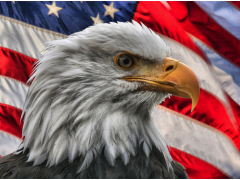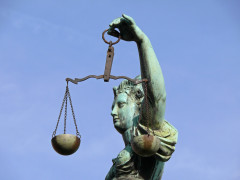Humans naturally need sustenance argues Aquinas following Aristotle.
[This is a continuation of my discussion of Aquinas on private property rights. ST II-II, 66, 1 or ST 2a2ae. 66, 1 (Summa Theologiæ, Part II of Part II, Question 66) in order as follows: The Full Text, Prologue / Beginning, Article 1, Objection 1, Objection 2, Objection 3, Aquinas’s Answer, Part I, Aquinas’s Answer, Part II. Aquinas, Aristotle and the Naturalness of Sustenance (this blog), Reply to Objections]
For convenience I am reproducing again Aquinas’s statement that includes his mention of Aristotle:
“I answer that, External things can be considered in two ways. First, as regards their nature, and this is not subject to the power of man, but only to the power of God Whose mere will all things obey. Secondly, as regards their use, and in this way, man has a natural dominion over external things, because, by his reason and will, he is able to use them for his own profit, as they were made on his account: for the imperfect is always for the sake of the perfect, as stated above (Question 64, Article 1). It is by this argument that the Philosopher [Aristotle] proves (Polit. i, 3) that the possession of external things is natural to man. Moreover, this natural dominion of man over other creatures, which is competent to man in respect of his reason wherein God’s image resides, is shown forth in man’s creation (Gn.1:26) by the words: “Let us make man to our image and likeness: and let him have dominion over the fishes of the sea,” etc.
My commentary
Aquinas here appeals to Aristotle, to validate his claim that “man has a natural dominion over external things. ” Aquinas notes that he had already dealt with a similar discussion earlier in his discussion of murder (ST 2a2ae, 64, 1). There Aquinas considers “Whether it is unlawful to kill any living thing?” That question is really just a more extreme form of the question he asks here about the justification of possession and use. For killing an animal for food is a use that destroys life and the existence of the thing. He concludes there, that it is indeed lawful to take the lives of animals:
I answer that, There is no sin in using a thing for the purpose for which it is. Now the order of things is such that the imperfect are for the perfect, even as in the process of generation nature proceeds from imperfection to perfection. Hence it is that just as in the generation of a man there is first a living thing, then an animal, and lastly a man, so too things, like the plants, which merely have life, are all alike for animals, and all animals are for man. Wherefore it is not unlawful if man use plants for the good of animals, and animals for the good of man, as the Philosopher states (Polit. i, 3) [Note: some translations cite Aristotle, Politics 1,8][1]See the Blackfriars’s translation, ST Thomas Aquinas, Summa Theologiæ, Vol. 38, 64, Blackfriars with McGraw-Hill: New York 1975
In both his discussion of murder there, and property (theft) here, Aquinas appeals to Aristotle’s Politics Book I without specifying the precise chapter, and concludes that the great philosopher of reason and natural law had reached the same conclusion “that the possession of external things is natural to man.” Aristotle in fact has quite a number of things to say about possessions and property and their relationship to the purpose of the household and to human virtue. However, it is very possible that Aquinas may be invoking one particular argument that the philosopher had made.
Aquinas on Aristotle on Property
As noted, Aquinas cites Aristotle’s Politics Book 1 without specifically calling out which part or chapter of Aristotle’s argument he has in mind. Some translations of Aquinas have him referring to Politics 1.3 and some to Politics I.8. It is possible, therefore, to interpret Aquinas either narrowly or more broadly. My own sense is that he should be interpreted more narrowly, for reasons discussed below.[2]This would be the Blackfriars’s assumption as well On the narrow interpretation, Aquinas is appealing to one very specific argument from Aristotle. On the broader interpretation, one can understand Aquinas as appealing to Aristotle’s much broader argument about private property generally that starts in Book 1 of Politics and continues throughout Book 2. On this broader interpretation, Aquinas is pointing to the philosopher’s general arguments about private property. Let’s consider these points.
To begin with, Books I and II of Politics contain Aristotle’s classic arguments about the nature of possessions, private property, commercial exchange and wealth. These topics arise in the context of Aristotle’s discussion of the household, what he considers the basic building block for the city which is in his day the political community. The discussion of possessions and property is embedded in a broader discussion of the nature of the household, the relationship of household members, including master and slave, husband and wife, parent and child. Aristotle’s main purpose is to understand the purpose of the household and ultimately its virtuous functioning or flourishing. Because possessions and property are central to household activity, Aristotle offers not only a justification of possessions and private property but differentiates what he regards as natural and virtuous activity with respect to the acquisition and use of goods, from what he considers unnatural and non-virtuous accumulation of wealth. It is in his discussion of this topic in Book II that he offers his classic critique of Socrates’s idea of communism as developed in Plato’s Republic.
Socrates had argued that the Guardian class of the best city should share wives, children and property.[3]Aristotle initially writes as if Socrates had suggested communism for the whole city Aristotle in Politics II.2.i [1261a] and II.2.iv takes on that claim and argues that while there has to be some sharing for a community to be a political community, the sharing of wives, children and property is too much. It is in this context that Aristotle gives a number of arguments justifying the benefits of private property and one of his classic defenses of private property which is often quoted:
What belongs in common to the most people is accorded the least care: they take thought for their own things above all, and less about things common, or only so much as falls to each individually. For, apart from other things, they slight them on the grounds that someone else is taking thought for them… (II.3.iv –viii, 1261b).[4]Aristotle’s Politics. 2nd Ed., Trans with an introduction by Carnes Lord. Chicago: The University of Chicago Press. 2013, 27
My purpose here is not to completely outline Aristotle’s views on property, which is a complex subject in its own right.[5]Excellent discussions of Aristotle’s views on property can be found in R. G. Mulgan, Aristotle’s Political Theory. Oxford: Clarendon Press, 1977, 46-52 on property. David Lametti, “The … Continue reading I shall come back to that topic at another time. Rather, my intent is to explore how Aquinas’s views here relate to Aristotle’s broader arguments. Which of Aristotle’s arguments is Aquinas drawing on here? Since Aquinas is here only answering the question “whether it is natural for man to possess external things” (and not yet answering the question whether private property is natural as well), we can expect him to just be drawing from that part of Aristotle that deals with that issue.
Our first observation is that Aristotle does not explicitly make the sharp conceptual distinction that Aquinas does between possessing external things and having private property, though Aristotle does imply that some uses of natural things are more natural than others.[6]See Mulgan’s discussion of this point Nonetheless, Aristotle does make precisely the same kind of argument as Aquinas about the naturalness of sustenance and it is it is very reasonable to assume this is what Aquinas had in mind when he cites the philosopher.[7]This seems to be the assumption of the Blackfriars’s translation.
The passage in question appears in Politics I.8.iv-xii [1256b]. Aristotle is discussing the natural ways in which living beings find sustenance and notes that it is impossible to live without sustenance. He notes the naturalness of breast milk as one way in which mammals nurture their young and how different types of animals have different modes of sustaining themselves, whether carnivores, herbivores or omnivores. “It is with a view to their convenience and their predilections in these matters that nature has determined their ways of life” [I.8.v]. Similarly, Aristotle notes that humans have different forms of life to support themselves (hunting, agriculture, etc.).
It is from this natural need for sustenance that Aristotle reaches his conclusion that property is natural. “Now property of this sort is evidently given by nature itself to all animals, both immediately from birth and when they reach completion.” [I.9]. What Aristotle means here is that nature has provided for ways that living creatures can sustain themselves both at birth (e.g., milk) and when they “reach completion” or what we would call maturity. When they are mature, each type of creature has its own way of achieving sustenance. He then concludes that all of nature is provided for in this way and he makes a case for a hierarchy in nature, in precisely the same way as Aquinas does so in the present context on theft and property. Here is Aristotle on this point.
It is clear in a similar way, therefore, that for grown things as well one must suppose both that plants exist for the sake of animals and that other animals exist for the sake of human beings—the tame animals both for use and sustenance, and most if not all of the wild animals, for sustenance and other assistance, in order that clothing and other instruments may be got from them.[8]Politics I.8.ix-xii, 1256b
Aristotle’s teleological argument, which Aquinas also adopts, is that things below are made for the creature one step higher in the hierarchy. “If, then, nature makes nothing that is incomplete or purposeless, nature must necessarily have made all of these for the sake of human beings.” [9]Politics I.8.xii The nature of a thing is the purpose for which it is made. As Aristotle says, “…what each thing is-for example, a human being, a horse, or a household-when its [sic] coming into being is complete is, we assert, the nature of that thing.”[10]Politics I.2.viii, 1252b As one interpreter of Aristotle puts it, “The natural world and all the natural species which it contained are organized according to a rational plan or order.”[11]Mulgan, Aristotle’s Political Theory, 48
We can reasonably conclude, therefore, that Aquinas is here aligning his reading of Genesis 1.26-28 with Aristotle’s understanding of nature. Aristotle sees the need for sustenance as natural and what is natural justifies what is right. Thus, nature endorses the use of this kind of property or what Aquinas would call the natural possession of external things.
Alignment and Snags
Everything seems to align perfectly so far. But there are two important caveats or snags.
First, we should not that Aristotle uses the word “property” to describe the things that creatures can take from nature for food. As quoted previously, he writes that “Now property [my emphasis] of this sort is evidently given by nature itself to all animals, both immediately from birth and when they reach completion.” [12]Politics I.9 Thus Aristotle calls sustenance “property” and recognizes different sorts of property. Aristotle thus seems to push property back to the beginning of life. If life has sustenance, it has property. There are not “possessions” which are not property. Aquinas, as noted earlier, seems to recognize a conceptual distinction between taking possession of natural things and the concept of private property.
There is a second small but important snag. Aquinas seems to align Genesis and Aristotle’s views. But Genesis 1.29-30 does not seem to authorize humans taking the lives of animals or indeed of any animal taking the life of another creature. Previously we looked only at Gen. 1.26-28. Let’s read Genesis again including verses 29-30. Here again is Gen. 1.26-30 from the King James version.
1.26 And God said, Let us make man in our image, after our likeness: and let them have dominion over the fish of the sea, and over the fowl of the air, and over the cattle, and over all the earth, and over every creeping thing that creepeth upon the earth.
1.27 So God created man in his own image, in the image of God created he him; male and female created he them.
1.28 And God blessed them, and God said unto them, Be fruitful, and multiply, and replenish the earth, and subdue it: and have dominion over the fish of the sea, and over the fowl of the air, and over every living thing that moveth upon the earth.
1.29 And God said, Behold, I have given you every herb bearing seed, which is upon the face of all the earth, and every tree, in the which is the fruit of a tree yielding seed; to you it shall be for meat.
1.30 And to every beast of the earth, and to every fowl of the air, and to every thing that creepeth upon the earth, wherein there is life, I have given every green herb for meat: and it was so.
In Gen. 1.28, God tells the human being or human pair to reproduce and have dominion. We have discussed the idea of dominion as Aquinas understands it at some length. But then in verses 29 and 30, God appears to authorize the human being to have only vegetation for food. On the surface, it would appear that in Paradise that neither humans nor animals are authorized by nature to be carnivores. In fact, we know that Aquinas thinks that in Paradise humans did not eat meat and only ate from the tree of fruit. But he assumes that the creatures that are carnivores were carnivores (against the opinion of other Christian saints such as Augustine).
Thus it appears on the face of it that state of nature described by Aristotle, in which both carnivores and herbivores exist, and in which humans may kill animals for food, does not refer to nature in Paradise as Genesis describes it and Aquinas understands it. Instead it refers to nature after the sin of the first parents and in particular after the Flood. For it is after the flood that God seems to recognize and authorize humans to eat flesh. Here are the verses describing the blessing Noah and his sons receive after the flood (Gen 9:1-5).
9.1 And God blessed Noah and his sons, and said unto them, Be fruitful, and multiply, and replenish the earth.
9.2And the fear of you and the dread of you shall be upon every beast of the earth, and upon every fowl of the air, upon all that moveth upon the earth, and upon all the fishes of the sea; into your hand are they delivered.
9.3 Every moving thing that liveth shall be meat for you; even as the green herb have I given you all things.
9.4 But flesh with the life thereof, which is the blood thereof, shall ye not eat.
9.5And surely your blood of your lives will I require; at the hand of every beast will I require it, and at the hand of man; at the hand of every man’s brother will I require the life of man.
Aristotle does not have the two stages of “natural” development that is suggested in Genesis. If we had to map Aristotle to Genesis, therefore, Aristotle’s comments on what’s natural seem to allude to the situation after the flood, at least in his statements about the naturalness of sustenance.
Is there any evidence that this is how Aquinas takes Aristotle? Not here in this passage on property and theft. Here Aquinas makes it seem as if Aristotle and Genesis are perfectly aligned. But in his earlier discussion of murder and in his commentary on creation we can discern that this is how he is aligning Genesis and Aristotle. Here is the continuation of his discussion of murder:
But what animals most need to use plants for, and men to use animals for, is food, which cannot be done without their being killed. It is, therefore, legitimate for animals to kill plants and for man to kill animals for their respective benefit. And this is ordained by God, as we learn from Genesis, Behold I have given you every plant yielding seed and every tree; you and everything that has the breath of life shall have them for food (Genes 1. 29-30) and again: every moving thing that lives shall be food for you. (Genesis 9.3) [13]ST II-II, 64, ii
Note how in this context that discusses murder and the taking of animal life, Aquinas references Genesis 9.3 and God’s dispensation to Noah, but not in the discussion of theft and property we have been considering. Recall that Aquinas differentiates the state of the human being in Paradise and after. In Paradise, the human has no need to eat animals, nor use them for food or clothing as discussed previously. After they are expelled from Paradise, humans need clothing, have to labor for food, and apparently develop a desire for eating meat and become carnivores. [14]I return to this discussion in my more detailed analysis of the human condition in Paradise.
As an aside, it is interesting to note that Aquinas thinks that carniverous animals did exist in Paradise and disagrees with earlier commentators who held that some animals became carniverous only after Paradise. Aquinas disagrees and holds that “man’s sin did not so change the nature of animals, that those whose nature it is now to eat other animals, like lions and hawks, would then have lived on a vegetable diet.” [15]ST Ia. 96, 1 How then does Aquinas read Genesis 1.30 which seems to say animals should be herbivores? He reads that verse as saying some but not all animals are to be herbivores, though the support for that reading is questionable. [16]Aquinas writes “Nor does the Gloss, quoting Bede on Genesis, say that trees and grass were given to all animals and birds for food, but to some of them” [emphasis mine]. The … Continue reading)
In any case, it would seem safe to conclude, that Aquinas takes Aristotle as offering a description of what’s natural post Paradise, but not in Paradise. Aristotle starts with the naturalness of sustenance and the fact that it is natural for humans to be carnivores. Aquinas clearly thinks such as state is not that way at creation but only after the expulsion and flood. One might say, therefore, that Aquinas sees revelation as offering details about an original human nature that one cannot get to via reason. Reason discovers what is natural about our world as it is constituted now. Revelation turns up what is true about human natures before our current nature existed.
This seems a reasonable way to align Aquinas and Aristotle. Yet, one outstanding question remains. If Aristotle is not talking about human nature as it exists in Paradise, why does Aquinas here in his discussion of theft and possessions quote Genesis 1.26-28 and associate it with Aristotle’s position?
One possible answer is this: Aquinas sees the origin of “dominion” and the hierarchy of being as being put in place in Creation. In Paradise, however, that structure did not have to be deployed to mean humans actually needed external things. They had the power to command creatures but no need to do so, except for intellectual inquiry. After the sin and explusion, those implicit structures of dominion survive but now creatures no longer obey humans, humans have needs and therefore humans are allowed to exercise use and even consumption.
Above, I suggested that we could read Aquinas narrowly, as evoking only one particular part of Aristotle’s argument, or broadly, as invoking his thinking throughout Books I and II of Politics. We have discussed the narrow interpretation. On the broader interpretation, Aquinas is not just alluding to Aristotle’s argument about sustenance and the hierarchy implicit in nature. He would also be invoking all of Aristotle’s other arguments about all the reasons that private property are beneficial. Since the topic of private property is actually the next topic in Aquinas’s discussion, we’ll postpone this larger discussion of Aquinas’s relationship to Aristotle to a later discussion.
References
| ↑1 | See the Blackfriars’s translation, ST Thomas Aquinas, Summa Theologiæ, Vol. 38, 64, Blackfriars with McGraw-Hill: New York 1975 |
|---|---|
| ↑2 | This would be the Blackfriars’s assumption as well |
| ↑3 | Aristotle initially writes as if Socrates had suggested communism for the whole city |
| ↑4 | Aristotle’s Politics. 2nd Ed., Trans with an introduction by Carnes Lord. Chicago: The University of Chicago Press. 2013, 27 |
| ↑5 | Excellent discussions of Aristotle’s views on property can be found in R. G. Mulgan, Aristotle’s Political Theory. Oxford: Clarendon Press, 1977, 46-52 on property. David Lametti, “The Objects of Virtue,”1-38. In Property and Community. Ed. Gregory S. Alexander and Eduardo M. Peñalver. Oxford:Oxford University, 2010 |
| ↑6 | See Mulgan’s discussion of this point |
| ↑7 | This seems to be the assumption of the Blackfriars’s translation. |
| ↑8 | Politics I.8.ix-xii, 1256b |
| ↑9 | Politics I.8.xii |
| ↑10 | Politics I.2.viii, 1252b |
| ↑11 | Mulgan, Aristotle’s Political Theory, 48 |
| ↑12 | Politics I.9 |
| ↑13 | ST II-II, 64, ii |
| ↑14 | I return to this discussion in my more detailed analysis of the human condition in Paradise. |
| ↑15 | ST Ia. 96, 1 |
| ↑16 | Aquinas writes “Nor does the Gloss, quoting Bede on Genesis, say that trees and grass were given to all animals and birds for food, but to some of them” [emphasis mine]. The Blackfriars’s translation (Vol.13, 126-127) indicates that Bede’s comment does not support Aquinas’s interpretation here. “The Gloss, quoting Bede, says nothing about ‘some of them’; the text runs Thus it is clear that animals did not then live by eating animals, but harmoniously fed on grass and fruit; and from the text of Bede himself, it is clear that St. Thomas cannot justly give him this pious interpetation. He [Bede] stands four-square for the opinion just rejected as altogether unreasonable. Here are his words, from the same work referred to in 2, a few lines lower down: Since it is clearly said that all plants were given to men and birds, and to all the beasts of the earth for good, it is plain that neither did great birds live by preying on weaker ones, nor did the ‘insidious wolf explore its ambuscadoes at the sheepfold door. (Georgics III, 537 |




